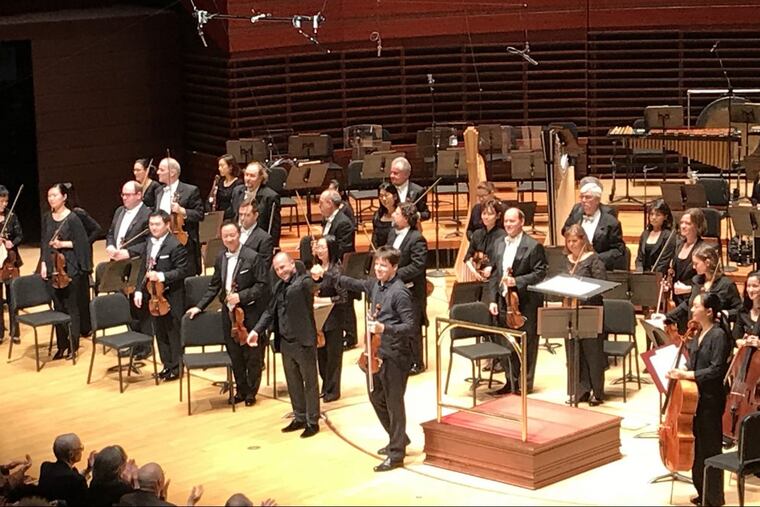Virtuoso Joshua Bell joins the Philadelphia Orchestra for a performance that mirrors real life
When a classical music concert is working particularly well, it tells you what you've been thinking and feeling, whether or not you consciously knew it.

When a classical music concert is working particularly well, it tells you what you've been thinking and feeling, whether or not you consciously knew it. Nobody at the Philadelphia Orchestra could've known that its yin-and-yang program of Wieniawski's middle-weight Violin Concerto No. 2 and Shostakovich's Symphony No. 7 would accidentally crystallize the collision of order and disorder that has characterized 2018 with its latest mass killings and ongoing contentious politics.
In another mind-set, the Thursday concert could seem like a marriage of convenience, with star soloist Joshua Bell doing his virtuoso thing and music director Yannick Nézet-Séguin continuing his exploration of Shostakovich's Soviet-era angst. But the orderly zeitgeist of Wieniawski, and all the soul Bell brought to it, felt like the world's better half, while Shostakovich documented breakdown, destruction, and existential disillusionment — kind of like my life when I leave my well-ordered, civilized home for an outside world that, on many days, seems not to be getting better.
Though Wieniawski is sometimes compared to the virtuoso showcases of Paganini, the Violin Concerto No. 2 is much more than that, with lyricism that asserts its own character while respecting what has gone before, plus harmonic sophistication that reveals new emotions with every hearing. It tends to be a concerto for young players, but it certainly benefited from 50-year-old Bell's ability to get into the nooks of the piece in a way that young players might not. Though he doesn't toss off the violinistic fireworks with complete ease, he made you listen to even the most ornamental passages more carefully. And though the ever-youthful Bell is not typically a violinist you'd associate with that kind of perspective and depth, I made a point to listen without looking at him to hear the truth behind his playing when divorced from from his considerable stage presence. Well, he was entirely emotionally present at every turn on Thursday. He looks great but is better heard than seen.
The Shostakovich symphony received the kind of paint-peeling performance the Philadelphia Orchestra is well equipped to deliver, with all sections kept extremely busy with bombast that leaves you guessing about its purpose. Ostensibly written during the horrific World War II siege of Leningrad, the 1941 symphony reached the West like a distress signal to the outside world. Since then, Shostakovich's subversive side has received much investigation — heard in this symphony with nagging under-the-surface dissonances that undermine the musical edifices the composer was building (and sometimes as he was building them). Isolated moments sound almost like the broad burlesque of Charles Ives.
The problem I have with this symphony is that the first movement is like a self-contained tone poem and the following three movements are second-drawer Shostakovich. There's nothing in this that Shostakovich didn't do better in his Symphony No. 8. Whether the Seventh hangs together seems to depend on the weather. I've heard Valery Gergiev make it work, but not always. And though Nézet-Séguin had much of Gergiev's boldness, I couldn't help but hearing the symphony's last three movements as ambling around in the wake of the first movement. This is not a majority opinion but one that has remained, despite decades of arguing with myself.
The program is repeated Feb. 16 and 18. On Feb. 17, conductor Cristian Macelaru leads the Wieniawski concerto with Bell and Dvorak's Symphony No. 8. Tickets: $59-178. Information: 215-893-1999 or www.philorch.org.